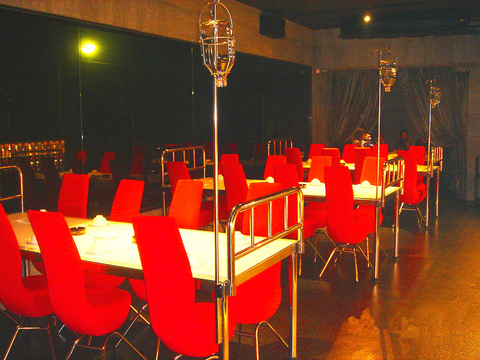When I stepped into DS Music Restaurant, I found it to be an extremely well-put-together, professional establishment with good food and a pleasant atmosphere that is night-lifey but not overwhelming. This disturbed me.
The reader is invited to consider the nurse fetish. It is an institution that lies at the heart of DS. And so I entered DS prepared to immerse myself in sleaze and then write ironically about it. What I found, though, was a disquietingly congruous marriage of unabashed hedonism and well-funded good taste.
Overall, DS looks like many other posh restaurant-and-bars, with lots of spot lighting, funny-shaped chairs, and clear alcohol bottles lit from underneath. Except that many of the tables look like sleek hospital beds, there are a few wheelchairs and crutches sitting around, backlit X-rays decorate some walls, and above each table hangs a big "IV drip," which functions like a small keg. And then, of course, there are nurses everywhere you look.

PHOTO COURTESY OF DS MUSIC RESTAURANT
The hospital theme is pervasive, but somehow subtle, or at least natural. I never thought I would say this, but it turns out that a wheelchair does not look out of place next to a wall of Smirnoff Ice bottles. There is something appealing about the audacity of taking a concept as (someone has to say it) flagrantly trashy as this and making something so cool out of it. To top it off, the food is good.
The menu consists of lightly Westernized Chinese, Japanese and Thai, with an inexplicable but not unwelcome Polynesian flare running through the presentation. The sashimi, for example, is served on a mountain of ice covered with leaves and flowers. The "Fire Pheonix Beer (sic)" (火鳳牛柳) is a successful beef-and-pineapple stir-fry served inside a hollowed-out half pineapple.
As is probably apparent in that last sentence, the English on the menu is more color commentary than viable translation. Some items -- like the pretty-good XO sauce stir-fry prawn ball (served on a bed of water convulvus) -- are more or less what they sound like, but the menu really isn't navigable without some knowledge of Chinese. Nor are the waitresses hired for their English.
It should be said that, DS, despite its thematically seamy underbelly, is family safe (the one exception is the Saturday night "showgirl" performance). The nurses outfits are not tailored to be especially kinky, and as far as I can tell the curtained-off "intensive care unit" is nothing more than a place where large groups can sit together.

When Taiwan was battered by storms this summer, the only crumb of comfort I could take was knowing that some advice I’d drafted several weeks earlier had been correct. Regarding the Southern Cross-Island Highway (南橫公路), a spectacular high-elevation route connecting Taiwan’s southwest with the country’s southeast, I’d written: “The precarious existence of this road cannot be overstated; those hoping to drive or ride all the way across should have a backup plan.” As this article was going to press, the middle section of the highway, between Meishankou (梅山口) in Kaohsiung and Siangyang (向陽) in Taitung County, was still closed to outsiders

President William Lai (賴清德) has championed Taiwan as an “AI Island” — an artificial intelligence (AI) hub powering the global tech economy. But without major shifts in talent, funding and strategic direction, this vision risks becoming a static fortress: indispensable, yet immobile and vulnerable. It’s time to reframe Taiwan’s ambition. Time to move from a resource-rich AI island to an AI Armada. Why change metaphors? Because choosing the right metaphor shapes both understanding and strategy. The “AI Island” frames our national ambition as a static fortress that, while valuable, is still vulnerable and reactive. Shifting our metaphor to an “AI Armada”

US President Donald Trump may have hoped for an impromptu talk with his old friend Kim Jong-un during a recent trip to Asia, but analysts say the increasingly emboldened North Korean despot had few good reasons to join the photo-op. Trump sent repeated overtures to Kim during his barnstorming tour of Asia, saying he was “100 percent” open to a meeting and even bucking decades of US policy by conceding that North Korea was “sort of a nuclear power.” But Pyongyang kept mum on the invitation, instead firing off missiles and sending its foreign minister to Russia and Belarus, with whom it

The Chinese Communist Party (CCP) has a dystopian, radical and dangerous conception of itself. Few are aware of this very fundamental difference between how they view power and how the rest of the world does. Even those of us who have lived in China sometimes fall back into the trap of viewing it through the lens of the power relationships common throughout the rest of the world, instead of understanding the CCP as it conceives of itself. Broadly speaking, the concepts of the people, race, culture, civilization, nation, government and religion are separate, though often overlapping and intertwined. A government